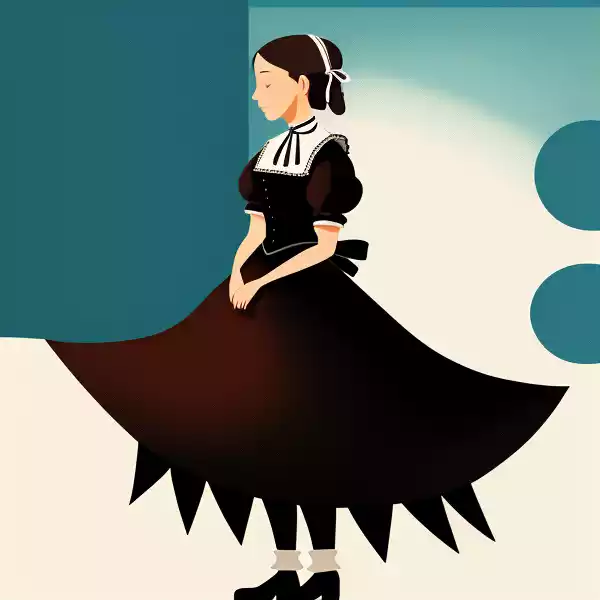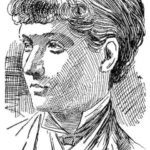 | |
The Maid’s Progress | |
| Author | Mary Hallock Foote |
|---|---|
| Published |
1888
|
| Language | English |
| Nationality | American |
| Genre | Historical Fiction, Western |
1888 Short Story
The Maid’s Progress
The Maid’s Progress is an English Historical Fiction, Western short story by American writer Mary Hallock Foote. It was first published in 1888.
The Maid’s Progress
by Mary Hallock Foote
From the great plateau of the Snake River, at a point that is far from any main station, the stage-road sinks into a hollow which the winds might have scooped, so constantly do they pounce and delve and circle round the spot. Down in this pothole, where sand has drifted into the infrequent wheel tracks, there is a dead stillness while the perpetual land gale is roaring and troubling above.
One noon at the latter end of summer a wagon carrying four persons, with camp gear and provision for a self-subsisting trip, jolted down into this hollow, the horses sweating at a walk as they beat through the heavy sand. The teamster drew them up and looked hard at the singular, lonely place.
“I don’t see any signs of that old corral, do you?” objected the man beside him. He spoke low, as if to keep his doubts from their neighbors on the back seat. These, an old, delicate, reverend looking gentleman, and a veiled woman sitting very erect, were silent, awaiting some decision of their fellow travelers.
“There wouldn’t be much of anything left of it,” the teamster urged on the point in question; “only a few rails and wattles, maybe. Campers would have made a clean-up of them.”
“You think this is the place, do you not, Mr. Thane? This is Pilgrim Station?” The old gentleman spoke to the younger of the two men in front, who, turning, showed the three-quarter view of a tanned, immobile face and the keen side glance of a pair of dense black eyes,–eyes that saw everything and told nothing.
“One of our landmarks seems to be missing. I was just asking Kinney about it,” he said.
Mr. Kinney was not, it appeared, as familiar as a guide should be with the road, which had fallen from use before he came to that part of the country; but his knowledge of roads in general inclined him to take with allowance the testimony of any one man of merely local information.
“That fool Mormon at the ferry hain’t been past here, he said himself, since the stage was pulled off. What was here then wouldn’t be here now–not if it could be eat up or burnt up.”
“So you think this is the place?” the old gentleman repeated. His face was quite pale; he looked about him shrinkingly, with a latent, apprehensive excitement strangely out of keeping with the void stillness of the hollow,–a spot which seemed to claim as little on the score of human interest or association as any they had passed on their long road hither.
“Well, it’s just this way, Mr. Withers: here’s the holler, and here’s the stomped place where the sheep have camped, and the cattle trails getherin’ from everywheres to the water, and the young rabbit brush that’s sprung up since the plains was burnt over. If this ain’t Pilgrim Station, we’re lost pilgrims ourselves, I guess. We hain’t passed it; it’s time we come to it, and there ain’t no road but this. As I put it up, this here has got to be the place.”
“I believe you, Mr. Kinney,” the old man solemnly confirmed him. “Something tells me that this is the spot. I might almost say,” he added in a lower tone to his companion, while a slight shiver passed over him in the hot sunlight, “that a voice cries to us from the ground!”
Those in front had not heard him. After a pause Mr. Thane looked round again, smiled tentatively, and said, “Well?”
“Well, Daphne, my dear, hadn’t we better get out?” Mr. Withers conjoined.
She who answered to this pretty pagan name did so mutely by rising in her place. The wind had moulded her light-colored veil close to her half-defined features, to the outline of her cheeks and low-knotted hair; her form, which was youthful and slender, was swathed in a clinging raw-silk dust-cloak. As she stood, hesitating before summoning her cramped limbs to her service, she might have suggested some half-evolved conception of doubting young womanhood emerging from the sculptor’s clay. Personality, as yet, she had none; but all that could be seen of her was pure feminine.
Thane reached the side of the wagon before the veiled young woman could attempt to jump. She freed her skirts, stepped on the brake bar, and stooping, with his support made a successful spring to the ground. Mr. Withers climbed out more cautiously, keeping his hand on Thane’s arm for a few steps through the heavy sand. Thane left his fellow pilgrims to themselves apart, and returned to help the teamster take out the horses.
“It looks queer to me,” Mr. Kinney remarked, “that folks should want to come so far on purpose to harrer up their feelin’s all over again. It ain’t as if the young man was buried here, nor as if they was goin’ to mark the spot with one of them Catholic crosses like you see down in Mexico, where blood’s been spilt by the roadside. But just to set here and think about it, and chaw on a mis’able thing that happened two years and more ago! Lord! I wouldn’t want to, and I ain’t his father nor yet his girl. Would you?”
“Hardly,” said Thane. “Still, if you felt about it as Mr. Withers does, you’d put yourself in the place of the dead, not the living; and he has a reason for coming, besides. I haven’t spoken of it, because I doubt if the thing is feasible. He wants to see whether the water, of the spring can be brought into the hollow here–piped, to feed a permanent drinking trough and fountain. Good for evil, you see–the soft answer.”
“Well, that’s business! That gits down where a man lives. His cattle kin come in on that, too. There’s more in that, to my mind, than in a bare wooden cross. Pity there won’t be more teamin’ on this road. Now the stage has hauled off, I don’t expect as many as three outfits a year will water at that fountain, excusin’ the sheep, and they’ll walk over it and into it, and gorm up the whole place.”
“Well, the idea has been a great comfort to Mr. Withers, but it’s not likely anything more will ever come of it. From all we hear, the spring would have to run up hill to reach this hollow; but you won’t speak of it, will you, till we know?”
“Gosh, no! But water might be struck higher up the gulch–might sink a trench and cut off the spring.”
“That would depend on the source,” said Thane, “and on how much the old gentleman is willing to stand; the fountain alone, by the time you haul the stone here, will foot up pretty well into the thousands. But we’ll see.”
“Hadn’t you better stay round here with them till I git back?” Kinney suggested; for Thane had taken the empty canteens from the wagon, and was preparing to go with him to the spring. “You kin do your prospectin’ later.”
“They would rather be by themselves, I think,” said Thane. But seeing Mr. Withers coming towards him, as if to speak, he turned back to meet him.
“You are going now to look for the spring, are you not?” the old gentleman asked, in his courteous, dependent manner.
“Yes, Mr. Withers. Is there anything I can do for you first?”
“Nothing, I thank you.” The old gentleman looked at him half expectantly, but Thane was not equal, in words, to the occasion. “This is the place, Mr. Thane,” he cadenced, in his measured, clerical tones. “This is the spot that last saw my dear boy alive,–that witnessed his agony and death.” He extended a white, thin, and now shaking hand, which Thane grasped, uncovering his head. Mr. Withers raised his left hand; his pale eyes blinked in the sunlight; they were dim with tears.
“In memory of John Withers,” he pronounced, “foully robbed of life in this lonely spot, we three are gathered here,–his friend, his father, and his bride that should have been.” Thane’s eyes were on the ground, but he silently renewed his grasp of the old man’s hand. “May God be our Guide as we go hence to finish our separate journeys! May He help us to forgive as we hope to be forgiven! May He teach us submission! But, O Lord! Thou knowest it is hard.”
“Mr. Withers is a parson, ain’t he?” Kinney inquired, as he and Thane, each leading one of the team horses, and with an empty canteen swinging by its strap from his shoulder, filed down the little stony gulch that puckers the first rising ground to riverward of the hollow. “Thought he seemed to be makin’ a prayer or askin’ a blessin’ or somethin’, when he had holt of you there by the flipper; kind of embarrassin’, wa’n’t it?”
“That’s as one looks at it,” said Thane. “Mr. Withers is a clergyman; his manner may be partly professional, but he strikes one as always sincere. And he hasn’t a particle of self-consciousness where his grief for his son is concerned. I don’t know that he has about anything. He calls on his Maker just as naturally as you and I, perhaps, might take his name in vain.”
“No, sir! I’ve quit that,” Mr. Kinney objected. “I drawed the line there some years ago, on account of my wife, the way she felt about it, and the children growin’ up. I quit when I was workin’ round home, and now I don’t seem to miss it none. I git along jest as well. Course I have to cuss a little sometimes. But I liked the way you listened to the old man’s warblin’. Because talkin’ is a man’s trade, it ain’t to say he hasn’t got his feelin’s.”
As the hill cut off sounds of retreating voices and horseshoes clinking on the stones, a stillness that was a distinct sensation brooded upon the hollow. Daphne sighed as if she were in pain. She had taken off her veil, and now she was peeling the gloves from her white wrists and warm, unsteady hands. Her face, exposed, hardly sustained the promise of the veiled suggestion; but no man was ever known to find fault with it so long as he had hopes; afterwards–but even then it was a matter of temperament. There were those who remembered it all the more keenly for its daring deviations and provoking shortcomings.
It could not have been said of Daphne that her grief was without self-consciousness. Still, much of her constraint and unevenness of manner might have been set down to the circumstances of her present position. Why she should have placed herself, or have allowed her friends to place her, in an attitude of such unhappy publicity Thane had asked himself many times, and the question angered him as often as it came up. He could only refer it to the singularly unprogressive ideas of the Far West peculiar to Far Eastern people. Apparently they had thought that, barring a friend or two of Jack’s, they would be as much alone with their tragic memories in the capital city of Idaho as at this abandoned stage-station in the desert where their pilgrimage had ended. They had not found it quite the same. Daphne could, and probably did, read of herself in the “Silver Standard,” Sunday edition, which treats of social events, heralded among the prominent arrivals as “Jack Withers’s maiden widow.” This was a poetical flight of the city reporter. Thane had smiled at the phrase, but that was before he had seen Daphne; since then, whenever he thought of it, he pined for a suitable occasion for punching the reporter’s head. There had been more of his language; the paper had given liberally of its space to celebrate this interesting advent of the maiden widow with her uncle, “the Rev. Withers,” as the reporter styled him, “father of the lamented young man whose shocking murder, two years ago, at Pilgrim Station, on the eve of his return to home and happiness, cast such a gloom over our community, in which the victim of the barbarous deed had none but devoted friends and admirers. It is to be hoped that the reverend gentleman and the bereaved young lady, his companion on this sad journey, will meet with every mark of attention and respect which it is in the power of our citizens to bestow, during their stay among us.”
Now, in the dead, hot stillness, they two alone at last, Daphne sat beside her uncle in the place of their solemn tryst; and more than ever her excitement and unrest were manifest, in contrast to his mild and chastened melancholy. She started violently as his voice broke the silence in a measured, musing monotone:
“‘Drink, weary pilgrim, drink and pray For the poor soul of Sibyl Grey, Who built this cross and well.’
“These lines,” he continued in his ordinary prose accent, “gave me my first suggestion of a cross and well at Pilgrim Station, aided, perhaps, by the name itself, so singularly appropriate; not at all consistent, Mr. Thane tells me, with the usual haphazard nomenclature of this region. However, this is the old Oregon emigrant trail, and in the early forties men of education and Christian sentiment were pioneers on this road. But now that I see the place and the country round it, I find the Middle Ages are not old enough to borrow from. We must go back, away back of chivalry and monkish superstition, to the life-giving pools of that country where the story of man began; where water, in the language of its people, was justly made the symbol of their highest spiritual as well as physical needs and cravings. ‘And David longed, and said, Oh, that one would give me drink of the water of the well of Beth-lehem, that is at the gate!’ It is a far cry here to any gate but the gate of sunset, which we have been traveling against from morning to evening since our journey began, yet never approaching any nearer. But this, nevertheless, is the country of David’s well,–a dry, elevated plain, surrounded by mountains strangely gashed and riven and written all over in Nature’s characters, but except for the speech of a wandering, unlettered people, dumb as to the deeds of man. Mr. Thane tells me that if the wells on this road were as many as the deaths by violence have been, we might be pasturing our horses in green fields at night, instead of increasing their load with the weight of their food as well as our own. Yes, it is a ‘desolate land and lone;’ and if we build our fountain, according to my first intention, in the form of a cross, blessing and shadowing the water, it must be a rude and massive one, such as humble shepherds or herdsmen might accidentally have fashioned in the dark days before its power and significance were known. It will be all the more enduring, and the text shall be”–
“Uncle,” cried Daphne in a smothered voice, “never mind the text! I am your text! Listen to me! If your cross stood there now, here is the one who should be in the dust before it!” She pressed her open hand upon her breast.
The gesture, her emphasis, the extreme figure of speech she had used, were repellent to Mr. Withers over and above his amazement at her words. As he had not been observing her, he was totally unprepared for such an outburst.
“Daphne, my dear! Do I understand you? I cannot conceive”–
But Daphne could not wait for her meaning to sink in. “Uncle John,” she interrupted, taking a quick breath of resolution, “I have read somewhere that if a woman is dishonest, deep down, deliberately a hypocrite, she ought to be gently and mercifully killed; a woman not honest had better not be alive. Uncle, I have something to say to you about myself. Gently and mercifully listen to me, for it ought to kill me to say it!”
Mr. Withers turned apprehensively, and was startled by the expression of Daphne’s face. She was undoubtedly in earnest. He grew quite pale. “Not here, my dear,” he entreated; “not now. Let our thoughts be single for this one hour that we shall be alone together. Let it wait for a little, this woeful confession. I think you probably exaggerate your need of it, as young souls are apt to who have not learned to bear the pain of self-knowledge, or self-reproach without knowledge. Let us forget ourselves, and think of our beloved dead.”
“Uncle, it must be here and now. I cannot go away from this place a liar, as I came. Let me leave it here,–my cowardly, contemptible falsehood,–in this place of your cross. I am longing, like David, for that water they have gone to find, but I will not drink at Pilgrim Station, except with clean lips that have confessed and told you all.”
Mr. Withers shrank from these unrestrained and to him indecorous statements of feeling; they shocked him almost as much as would the spectacle of Daphne mutilating her beautiful hair, casting dust upon her head, and rending her garments before him. He believed that her trouble of soul was genuine, but his Puritan reserve in matters of conscience, his scholarly taste, his jealousy for the occasion which had brought them to that spot, all combined to make this unrestrained expression of it offensive to him. However, he no longer tried to repress her.
“Uncle, you don’t believe me,” she said; “but you must. I am quite myself.”
“Except for the prolonged nervous strain you have been suffering; and I am afraid I have not known how to spare you as I might the fatigue, the altitude perhaps, the long journey face to face with these cruel memories. But I will not press it, I will not press it,” he concluded hastily, seeing that his words distressed her.
“Press it all you can,” she said. “I wish you could press it hard enough for me to feel it; but I feel nothing–I am a stone. At this moment,” she reiterated, “I have no feeling of any kind but shame for myself that I should be here at all. Oh, if you only knew what I am!”
“It is not what you are, it is who you are, that brings you here, Daphne.”
“Yes, who I am! Who am I? What right had I to come here? I never loved him. I never was engaged to him, but I let you think so. When you wrote me that sweet letter and called me your daughter, why didn’t I tell you the truth? Because in that same letter you offered me his money–and–and I wanted the money. I lied to you then, when you were in the first of your grief, to get his money! I have been trying to live up to that He ever since. It has almost killed me; it has killed every bit of truth and decent womanly pride in me. I want you to save me from it before I grow any worse. You must take back the money. It did one good thing: it paid those selfish debts of mine, and it made mother well. What has been spent I will work for and pay back as I can. But I love you, uncle John; there has been no falsehood there.”
“This is the language of sheer insanity, Daphne, of mental excitement that passes reason.” Mr. Withers spoke in a carefully controlled but quivering voice–as a man who has been struck an unexpected and staggering blow, but considering the quarter it came from, is prepared to treat it as an accident. “The facts, John’s own words in his last letter to me, cannot be gainsaid. ‘I am coming home to you, dad, and to whom else I need not say. You know that I have never changed, but she has changed, God bless her! How well He made them, to be our thorn, our spur, our punishment, our prevention, and sometimes our cure! I am coming home to be cured,’ he said. You have not forgotten the words of that letter, dear? I sent it to you, but first–I thought you would not mind–I copied those, his last words. They were words of such happiness; and they implied a thought, at least, of his Creator, if not that grounded faith”–
“They were hopes, only hopes!” the girl remorsefully disclaimed. “I allowed him to have them because I wanted time to make up my wretched, selfish mind. I had never made him a single promise, never said one word that could give me the right to pose as I did afterwards, to let myself be grieved over as if I had lost my last hope on earth. I had his money all safe enough.”
“Daphne, I forbid you to speak in that tone! There are bounds even to confession. If you think well to degrade yourself by such allusions, do not degrade me by forcing me to listen to you. This is a subject too sacred to be discussed in its mercenary bearings; settle that question with yourself as you will, but let me hear no more of it.”
Daphne was silenced; for the first time in her remembrance of him she had seen her uncle driven to positive severity, to anger even, in opposition to the truth which his heart refused to accept. When he was calmer he began to reason with her, to uphold her in the true faith, against her seeming self, in these profane and ruthless disclosures.
“You are morbid,” he declared, “oversensitive, from dwelling too long on this painful chapter of your life. No one knows better than myself what disorders of the imagination may result from a mood of the soul, a passing mood,–the pains of growth, perhaps. You are a woman now; but let the woman not be too hard upon the girl that she was. After what you have been through quite lately, and for two years past, I pronounce you mentally unfit to cope with your own condition. Say that you did not promise him in words; the promise was given no less in spirit. How else could he have been so exaltedly sure? He never was before. You had never before, I think, given him any grounds for hope?”
“No; I was always honest before,” said Daphne humbly. “When I first refused him, when we were both such children, and he went away, I promised to answer his letters if he would let that subject rest. And so I did. But every now and then he would try me again, to see if I had changed, and that letter I would not answer; and presently he would write again, in his usual way. As often as he brought up the old question, just so often I stopped writing; silence was always my answer, till that last winter, when I made my final attempt to do something with my painting and failed so miserably. You don’t know, uncle, how hard I have worked, or what it cost me to fail,–to have to own that all had been wasted: my three expensive winters in Boston, my cutting loose from all the little home duties, in the hope of doing something great that would pay for all. And that last winter I did not make my expenses, even. After borrowing every cent that mother could spare (more than she ought to have spared; it was doing without a girl that broke her down) and denying myself, or denying her, my home visit at Christmas; and setting up in a studio of my own, and taking pains to have all the surroundings that are said to bring success,–and then, after all, to fail, and fail, and fail! And spring came, and mother looked so ill, and the doctor said she must have rest, total rest and change; and he looked at me as if he would like to say, ‘You did it!’ Well, the ‘rest’ I brought her was my debts and my failure and remorse; and I wasn’t even in good health, I was so used up with my winter’s struggle. It was then, in the midst of all that trouble and shame and horror at myself, his sweet letter came. No, not sweet, but manly and generous,–utterly generous, as he always was. I ought to have loved him, uncle dear; I always knew it, and I did try very hard! He did not feel his way this time, but just poured out his whole heart once for all; I knew he would never ask me again. And then the fatal word; he said he had grown rich. He could give me the opportunities my nature demanded. You know how he would talk. He believed in me, if nobody else ever did; I could not have convinced him that I was a failure.
“It was very soothing to my wounds. I was absolutely shaken by the temptation. It meant so much; such a refuge from self-contempt and poverty and blame, and such rest and comfort it would bring to mother! I hope that had something to do with it. You see I am looking for a loophole to crawl out of; I haven’t strength of mind to face it without some excuse. Well, I answered that letter; and I think the evil one himself must have helped me, for I wrote it, my first careful, deliberate piece of double-dealing, just as easily as if I had been practicing for it all my life. It was such a letter as any man would have thought meant everything; yet if I had wanted, I could have proved by the words themselves that it meant nothing that couldn’t be taken back.
“I said to myself, If I can stand it, if I can hold out as I feel now, I will marry him; then let come what may. I knew that some things would come, some things that I wanted very much.
“Then came the strange delay, the silence, the wretched telegrams and letters back and forth. Ah, dear, do I make you cry? Don’t cry for him; you have not lost him. Cry for me, the girl you thought was good and pure and true! You know what I did then, when your dear letter came, giving me all he had, calling me your daughter, all that was left you of John! I deceived you in your grief, hating myself and loving you all the time. And here I am, in this place! Do you wonder I had to speak?”
“Your words are literally as blows to me, Daphne,” Mr. Withers groaned, covering his face. After a while he said, “All I have in the world would have been yours and your mother’s had you come to me, or had I suspected the trouble you were in. I ought to have been more observant. My prepossessions must be very strong; doubtless some of the readier faculties have been left out in my mental constitution. I hear you say these words, but even now they are losing their meaning for me. I can see that your distress is genuine, and I must suppose that you have referred it to its proper cause; but I cannot master the fact itself. You must give me time to realize it. This takes much out of life for me.”
“Not my love for you, uncle John; there has been no falsehood there.”
“You could not have spared yourself and me this confession?” the old man queried. “But no, God forgive me! You must have suffered grievous things in your young conscience, my dear; this was an ugly spot to hide. But now you have fought your fight and won it, at the foot of the cross. To say that I forgive you, that we both, the living and the dead, forgive you, is the very least that can be said. Come here! Come and be my daughter as before! My daughter!” he repeated. And Daphne, on her knees, put her arms about his neck and hid her face against him.
“Thank Heaven!” he murmured brokenly, “it cannot hurt him now. He has found his ‘cure.’ As a candle-flame in this broad sunlight, so all those earthly longings”–The old gentleman could not finish his sentence, though a sentence was dear to him almost as the truth from which, even in his love of verbiage, his speech never deviated. “So we leave it here,” he said at last. “It is between us and our blessed dead. No one else need know what you have had the courage to tell me. Your confession concerns no other living soul, unless it be your mother, and I see no reason why her heart should be perturbed. As for the money, what need have I for more than my present sufficiency, which is far beyond the measure of my efforts or deserts? I beg you never to recur to the subject, unless you would purposely wish to wound me. This is a question of conscience purely, and you have made yours clean. Are you satisfied?”
“Yes,” said Daphne faintly.
“What is the residue? Or is it only the troubled waters still heaving?”
“Yes, perhaps so.”
“Well, the peace will come. Promise me, dear, that you will let it come. Do not give yourself the pain and humiliation of repeating to any other person this miserable story of your fault.”
“It was more than a fault; you know that, uncle. Your conscience could not have borne it for an hour.”
“Your sin, then. A habit of confession is debilitating and dangerous. God has heard you, and I, who alone in this world could have the right to reproach you, have said to you, Go in peace. Peace let it be, and silence, which is the safest seal of a true confession.”
“Do you mean that I am never to let myself be known as I am?” asked Daphne. Her face had changed; it wore a look of fright and resistance. “Why, that would mean that I am never to unmask; to go about all my life in my trappings of false widowhood. You read what that paper called me! I cannot play the part any longer.”
“Are you speaking with reference to these strangers? But this will soon be over, dear. We shall soon be at home, where no one thinks of us except as they have known us all their lives. It will be painful for a little while, this conspicuousness; but these good people will soon pass out of our lives, and we out of theirs. Idle speculation will have little to do with us, after this.”
“There will be always speculation,” implored the girl. “It will follow me wherever I go, and all my life I shall be in bondage to this wretched lie. Take back the money, uncle, and give me the price I paid for it,–my freedom, myself as I was before I was tempted!”
“Ah, if that could be!” said the old gentleman. “Is it my poor boy’s memory that burdens you so? Is it that which you would be freed from?”
“From doing false homage to his memory,” Daphne pleaded. “I could have grieved for him, if I could have been honest; as it is, I am in danger almost of hating him. Forgive me, uncle, but I am! How do you suppose I feel when voices are lowered and eyes cast down, not to intrude upon my ‘peculiar, privileged grief? ‘Here I and Sorrow sit!’ Isn’t it awful, uncle? Isn’t it ghastly, indecent? I am afraid some day I shall break out and do some dreadful thing,–laugh or say something shocking, when they try to spare my feelings. Feelings! when my heart is as hard, this moment, to everything but myself, myself! I am so sick of myself! But how can I help thinking about myself when I can never for one moment be myself?”
“This is something that goes deeper,” said Mr. Withers. “I confess it is difficult for me to follow you here; to understand how a love as meek as that of the dead, who ask nothing, could lay such deadly weights upon a young girl’s life.”
“Not his love–mine, mine! Is it truly in his grave? If it is not, why do I dare to profess daily that it is, to go on lying every day? I want back my word, that I never gave to any man. Can’t one repent and confess a falsehood? And do you call it confessing, when all but one person in the world are still deceived?”
“It is not easy for me to advise you, Daphne,” said Mr. Withers wearily. “Your struggle has discovered to me a weakness of my own: verily, an old man’s fond jealousy for the memory of his son. Almost I could stoop to entreat you. I do entreat you! So long as we defraud no one else, so long as there is no living person who might justly claim to know your heart, why rob my poor boy’s grave of the grace your love bestows, even the semblance that it was? Let it lie there like a mourning wreath, a purchased tribute, we will say,” the father added, with a smile of sad irony; “but only a rude hand would rob him of his funereal honors. There seems to be an unnecessary harshness in this effort to right yourself at the cost of the unresisting dead. Since you did not deny him living, must you repudiate him now? Fling away even his memory, that casts so thin a shade upon your life, a faint morning shadow that will shrink as your sun climbs higher. By degrees you will be free. And, speaking less selfishly, would there not be a certain indelicacy in reopening now the question of your past relations to one whose name is very seldom spoken? Others may not be thinking so much of your loss–your supposed loss,” the old gentleman conscientiously supplied–“as your sensitiveness leads you to imagine. But you will give occasion for thinking and for talking if you tear open now your girlhood’s secrets. Whom does it concern, my dear, to know where or how your heart is bestowed?”
Daphne’s cheeks and brow were burning hot; even her little ears were scarlet. Her eyes filled and drooped. “It is only right,” she owned. “It is my natural punishment.”
“No, no; I would not punish nor judge you. I love you too well. But I know better than you can what a safeguard this will be,–this disguise which is no longer a deception, since the one it was meant to deceive knows all and forgives it. It will rebuke the bold and hasty pretenders to a treasure you cannot safely part with, even by your own gift, as yet. You are still very young in some ways, my dear.”
“I am old enough,” said Daphne, “to have learned one fearful lesson.”
“Do I oppress you with my view? Do I insist too much?”
Perhaps nothing could have lowered the girl in her own eyes more than this humility of the gentle old man in the face of his own self-exposed weakness, his pathetic jealousy for that self above self,—the child one can do no more than grieve for this side the grave. She had come to herself only to face the consciousness of a secret motive which robbed her confession of all moral value. Repentance, that would annul her base bargain now that the cos







